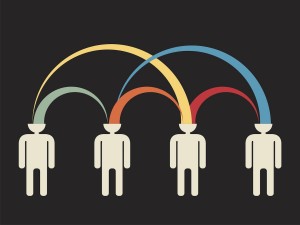Peer-to-peer business models are popping up everywhere. Just today, Boxbee launched a sharing library to allow people storing their unused goods to lend them to others. For a $15 delivery fee, any shared goods can be borrowed and no one needs to own a garage full of stuff. Instead, you have a sharing library to publish or browse that allows the user to participate in a sharing economy.
In a big-picture view on the same topic, an HBR piece just this morning, The Peer Economy Will Transform Work (or at Least How We Think of It), starts with, “You can’t avoid peer-to-peer marketplaces,” and goes on to say that peer-to-peer businesses allow people to enter the economy without the need to secure employment from a large company. The author, Denise Cheng, challenges us to reimagine what “full work” means based on a post-employment business model.
The end of the Industrial Revolution?
This is something that has the potential to completely change the world we live in — if we can wean ourselves off the false security of the way business is done today, that is. It took connectedness and mobility to set the wheels in motion (literally, if you think of the Uber taxi model). This new model is enabled by technology that is coming forward now, like Bitcoin as a peer-to-peer currency, Square for mobile payments and smartphones that allow an unlimited number of apps to create the peer-to-peer exchanges.
So what holds us back?
New ways of thinking of data - In the Industrial Age, information moved up and down the hierarchy of the workplace in very regular, structured ways. That’s why we created IT capabilities, including databases that think of data as hierarchical…it was how we thought of sectors, regions, products and reports. In this new world, the data moves sideways as often as up or down, and the timing and volumes aren’t nearly as predictable. The peer-to-peer world is a different animal, and companies that want to form around this model need to think of data as coming from anywhere, to anywhere. They need to think of constantly streaming information more than just transactions.
New ways of thinking of process - So many processes are built in silos and lack the horizontal model of peer-to-peer. Processes for running a peer-to-peer business are very wide and very flat. When Uber can be the biggest taxi company in the world without a single car, the process models have been completely stood on their heads.
The integration needs of this new world will foster new ways to think about location, data structure, business events and a host of other concepts. The technology and techniques will be different because the business models will be different. Each and every one of us will be effected.





 All Things D
All Things D ARS Technica
ARS Technica Engadget
Engadget GigaOM
GigaOM Mashable
Mashable TechCrunch
TechCrunch The Verge
The Verge Venture Beat
Venture Beat Wired
Wired Chris Brogan
Chris Brogan Brian Solis
Brian Solis Chris Dixon
Chris Dixon Clay Shirky Blog
Clay Shirky Blog HBR Blog
HBR Blog IT Redux
IT Redux Jeremiah Owyang
Jeremiah Owyang Radar O'Reilly
Radar O'Reilly Seth Godin Blog
Seth Godin Blog SocialMedia Today
SocialMedia Today Solve for Interesting
Solve for Interesting The TIBCO Blog
The TIBCO Blog Lifehacker
Lifehacker
